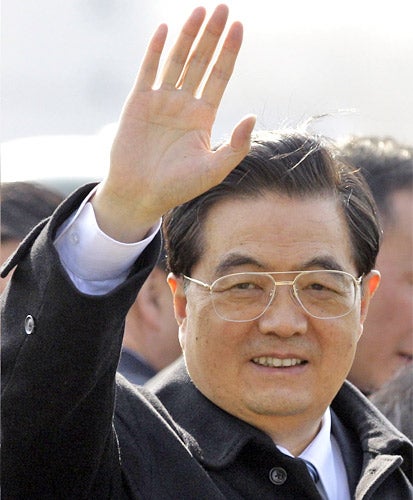US sees Chinese visit as chance to reassert itself

Your support helps us to tell the story
From reproductive rights to climate change to Big Tech, The Independent is on the ground when the story is developing. Whether it's investigating the financials of Elon Musk's pro-Trump PAC or producing our latest documentary, 'The A Word', which shines a light on the American women fighting for reproductive rights, we know how important it is to parse out the facts from the messaging.
At such a critical moment in US history, we need reporters on the ground. Your donation allows us to keep sending journalists to speak to both sides of the story.
The Independent is trusted by Americans across the entire political spectrum. And unlike many other quality news outlets, we choose not to lock Americans out of our reporting and analysis with paywalls. We believe quality journalism should be available to everyone, paid for by those who can afford it.
Your support makes all the difference.The US will try to step up pressure on China, during a state visit here this week by President Hu Jintao that many policymakers see as the most important encounter between the two countries since they re-established full diplomatic relations more than 30 years ago. Behind the pomp and circumstance, culminating in a banquet at the White House tonight, lie badly frayed relations, along with a pervasive sense that on the geostrategic chessboard, the US is steadily losing ground to, or simply being ignored by, an ever-more assertive China.
The points of dispute range from trade and what US officials claim is China's policy of keeping its currency deliberately undervalued, to the latter's diplomatic muscle-flexing and its military build-up in the Pacific, long regarded here as an "American pond".
Washington complains that Beijing is not pulling its weight in international efforts to circumscribe the nuclear programmes of Iran and North Korea. And after its refusal to allow the jailed dissident and 2010 Nobel peace laureate Lui Xiaobo to attend last year's award ceremony in Oslo, the US is again publicly challenging China's human rights record.
Major decisions are not expected from the discussions, which began with a private dinner between Mr Hu and President Obama last night and include a face-to-face between the two presidents and business leaders from both countries. Not only is Mr Hu, according to US analysts, instinctively cautious and risk-averse; he is also due to step down in 2012, when his two five year terms expire.
Even so, what happens during the four-day visit will bear heavily on the future of the most important bilateral relationship in the world.
China and the US, Secretary of State Hillary Clinton has said, were at "a critical juncture, a time when the choices we make, big and small, will shape the trajectory of this relationship".
Part of the problem is the exact nature of that relationship. The two countries are not allies – but neither are they enemies. Increasingly, however, they compete for influence. The US does not want to cede its global pre-eminence, but China wants to be treated as the major power it now is.
Beijing was seeking "the sound and steady development" of ties, vice-foreign minister Cui Tiankai told reporters in Beijing at a briefing ahead of Mr Hu's trip. But, he noted pointedly, "the growing strength of China and its standing in the world is a reality".
Of late Beijing has made some conciliatory gestures, slowing its investments in Iran and appearing to lean more heavily on North Korea. During his stay, moreover, Mr Hu is set to sign business contracts helping US companies, in a bid to correct the impression that trade between the countries is a virtual one-way street, to China's overwhelming advantage.
Meanwhile, the chill following a $6.3bn (£3.9bn) US arms sale to Taiwan in 2010, when China suspended military exchanges with the US, ended when Robert Gates, the Defence Secretary, travelled to Beijing last week. Even so, the Chinese military chose to mark the occasion by flight-testing a new stealth fighter during the trip, an event of which Mr Hu seemed unaware.
But these gestures may not be enough. Washington is beset by a sense it is being played for a sucker. While the US struggles with huge deficits and sluggish growth and is bogged down in endless wars in the Islamic world, China has been steadily building its influence around the world; its power deriving from its vast trade and currency surpluses and an economy expanding once more at 10 per cent a year.
Mr Obama himself is widely accused of not standing up sufficiently robustly for US interests. Critics complain the administration puts no substance behind its threats to get tough. As the University of Maryland's Professor Peter Morici puts it: "Obama talks the talk but doesn't walk the walk. No one sees that better than President Hu."
Join our commenting forum
Join thought-provoking conversations, follow other Independent readers and see their replies
Comments